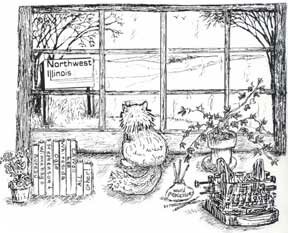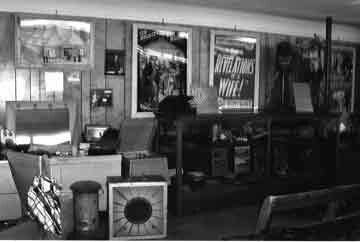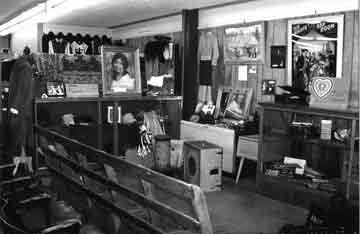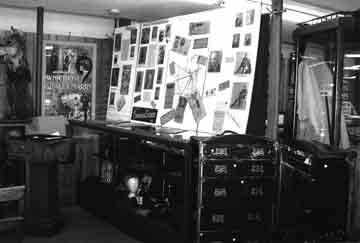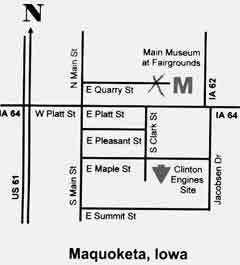
Discover rewarding casino experiences. 

Please Don't Quote Me PART III - It was a grueling schedule, twenty-one shows in less than a month's time. One on Christmas DayWaterloo ... Five others before the end of the year, all in Iowa.
Click on the Flag for More Information |
While the Opera Houses were thriving such theatrics played in them but as movie houses began to build separately and the Opera Houses declined, other arrangements had to be made ... Tents were used if a company didn't already have them. The Brooks Co. invested in a tent, 135 ft. by 55 ft. that held 800, not including chairs put up around the sides which they just might often do. As time passed and horses went out of fashion, the Brooks' like others used semis to carry equipment, scenery, props, etc. Imagine carrying all their gear for weeks at a time, day to day ... Setting up, taking down, literally living out of a trunk (see picture!). Everything was packed into compact trunks such as the make-up, food utensils, street clothes, stage clothes. Where was the food? Probably stacked up with the colorful posters and the ticket window to be set up at an entrance. Quite a life. One had to be healthy to last. The pictures here do not do justice to the hard work it was to transport a stage show and its paraphernalia months every year ... You were carrying your "job" along with you ... For over forty years.
An exhibit at the Jackson County Historical Society, Maquoketa, Iowa, gives you only a glimpse at the life of a stock company, one such as headquartered at Sabula. It was a theatrical troupe like few others ... By the thirties and forties they'd dwindled to a handful. But they must have been a hardy crew. At least we know that Maude Tomlinson was, she a direct descendant of a Carroll County pioneer. She derived from a frontiersman, her great-grandfather being Beers Tomlinson who came to Carroll County in 1838. He was raised in the shadow of Ft. Ticonderoga and perhaps inspired by that, became a colonel in the War of 1812. He was always called "Colonel." The Tomlinson's were widely-related to many of the families who settled York and Carroll Townships. Her father, DeWitt, died relatively young and in the course of time she and her mother moved to Savanna where she spent her growing-up years. In about 1890 the two moved to Sabula across the Mississippi where her mother remarried"Barney" Miller.
Certainly, Maude's pioneer background helped her attack the challenges it wold take to become a stage presence (although an "elocutionist" was more respectable than an actress, wasn't she?). Theatrical people weren't always considered to be of estimable character but Maude helped change that because of her "sunny, smiling disposition" and her considerable talent beyond the ordinary. Women in those far-off days had few careers to aspire to, so it was unusual for her to evolve into the stage business. Perhaps it was because of her "pioneer" background. (She was born May 9, 1879). Or the individuality of those in her family. There must have been a strain of independence among the women of the family because her close cousin also pursued a career usually open only to men ... That of a racing sulky driver, pacer or trotter. You will recall a PDQ Me article back in September of 2004, the 15th, about Neva Tomlinson Burright who headquartered in Oregon, Illinois but raced nationwide ... "Grandma," she was called, as she became more and more famous. She, too, was a tiny lass like Maude. Neva was a little younger, her birthday being June 10, 1882. She, too, had been born near Mt. Carroll so the Tomlinson family had two girls with uncommon abilities and a knack for being successful. An exhibit featuring "Grandma" Burright is displayed at the Ogle County Historical Society in Oregon. Those two special women grew up close in their birthplace, age and ingenuity. As years passed "modernity" came to Brooks Stock Co. as with everything else. One thing didn't change, however, and that was the kind of reviews they continued to receive even as years passed. Following are a few ... "The Brooks Co have played here all week to a good house. There have been very few, if any, troupes that have made this town who have been more deserving of good patronage than these people. They have a first-class band which enlivens the whole village by its music every noon and evening. Would that all show troupes were like the Brooks." Without question the Brooks Company at the Opera House next week is the best troupe that has ever played in Highland in seventeen years to the personal knowledge of this writer ... It is business-like troupes giving 50¢ and 75¢ value at half the price that gives the show business and local manager a clean bill of health ... They play "Ten Nights in a Bar Room," a play every boy and girl should see to learn one of the great lessons in life. Send your children and go yourself ... The Brooks Stock Company will be assured a much better patronage if they come to Highland another season now we know there are none better." Hopkinton "The Brooks Stock Co. closed a three night's engagement here Nov. 8 and we can recommend them as the strongest repertoire attraction that has ever played here. The feature play, "On the Bridge at Midnight" for which they carry an entire production, is something not often seen in small towns."
"The Brooks Stock Co. the best theatrical company that has visited this city for years is now giving high class entertainment at the Empire. Each member of the company is an artist, the price of admission moderate, and the house should be filled to overflowing every night ... Admission is 10¢ and 15¢." Columbus, Wisconsin ... "On the Bridge at Midnight" was the latest play done by the Brooks Co. ... It had a snap and dash that made it intensely interesting. Maude Tomlinson, the news boy, and lost child was decidedly the most interesting character. ... The scenic effect when the heroine was thrown from the bridge and later rescued by her love was very realistic." Good clean entertainments were the words heard year-after-year about the Brooks Stock Co. And not just from the thousands of Midwestern audiences who waited annually for their arrival when a good time really was had by all. No, a famous nationally-known theatre reviewer was long enamored of Maude Tomlinson Brooks and had been since seeing her for the first time when he was twelve in his hometown of Winslow, Illinois. George Eells was a leading, respected drama/theatrical critic for "Look" magazine in the '30's-'40's. It was the popular "People" magazine of its day. George, when a boy naturally helped set up the Brooks' tent when it arrived in Winslow, that to win a free ticket for the show. At that date he saw Maude for the first time, she wearing a brilliant evening gown, the first he'd ever seen. He fell in love and carried the image with him the rest of his life. Eells and the Brooks' became fast friends and it was Eells who prompted the television show, "This Is Your Life," in include Maude in a story about Neil Schaffner who had a long-running troupe also, the Schaffner Players. "This is Your Life" was an early television weekly that would surprise some celebrity, a well-known figure in some phase of society, then bring in people from their past to tell their story. It was hosted by Ralph Edwards, and very popular. When Eells was asked to appear for Schaffner, he immediately suggested that Maude be there and be recognized because, after all, the Brooks' show had lasted forty-four years, the longest of any traveling company in the nation. Maude was thrilled to be invited although by then the company had disbanded.
The couple had become "snowbirds," semi-retiring in 1946 to a mobile home park in Sarasota, Florida where Maude continued to winter after Jack's death in 1953. She had traveled with the tent show for another season following his passing, this at the urging of her widowed daughter-in-law, Barbara. A new phase of Maude's eventful life was about to begin. She lived in both Florida and Iowa, played bridge frequently, entertained and kept busy until her own death in Clinton in 1971, age 92. During her retirement she saw the value of donating the gear of the theatrical troupe to the county Historical Society where in the roominess of the County Fairgrounds it becomes the looked upon. All it needs is a magic wand waving to animate the entire. The small map here was suggested by the docent. It's on Rt. 64, a straight shot from the Mississippi and watch for the intersection of Rts. 62 & 64 where you'll turn to the inside of the fair buildings. It's marked. The phone number is . Open most weekdays. Check. There are some great exhibits otherwise, too. The Stock company, however, is a rarity among the now rare.
|

